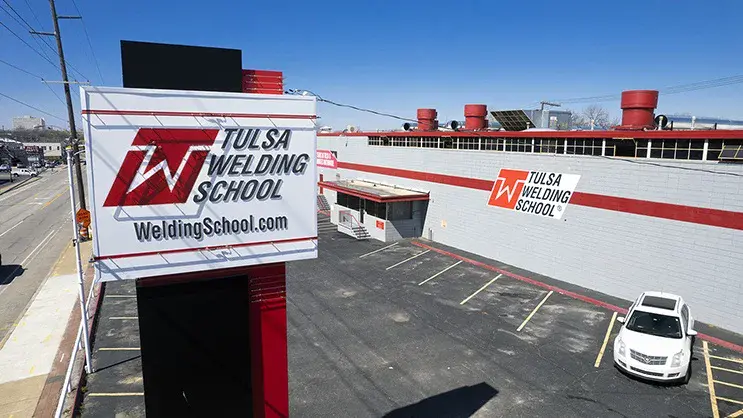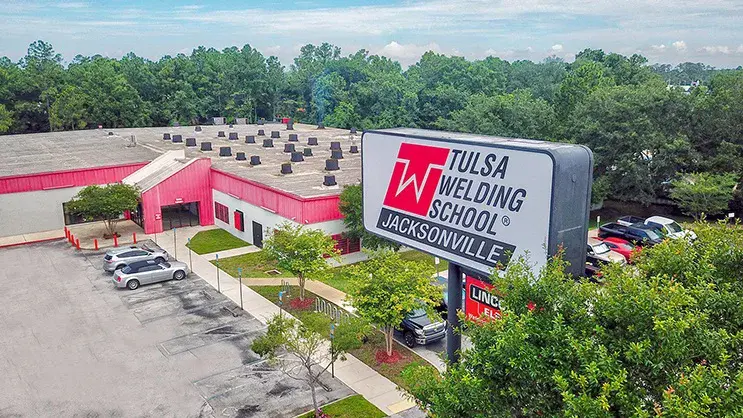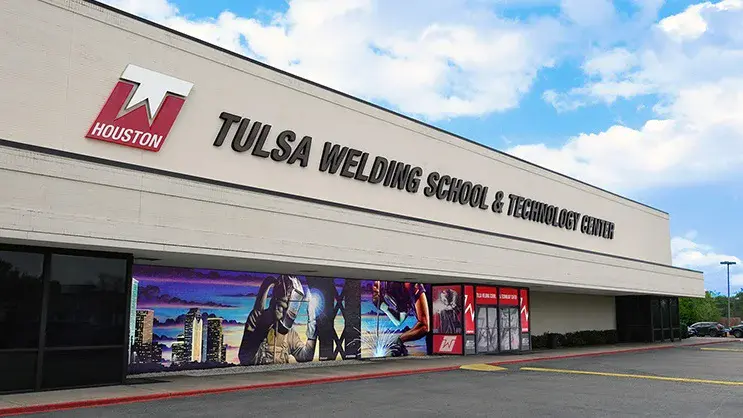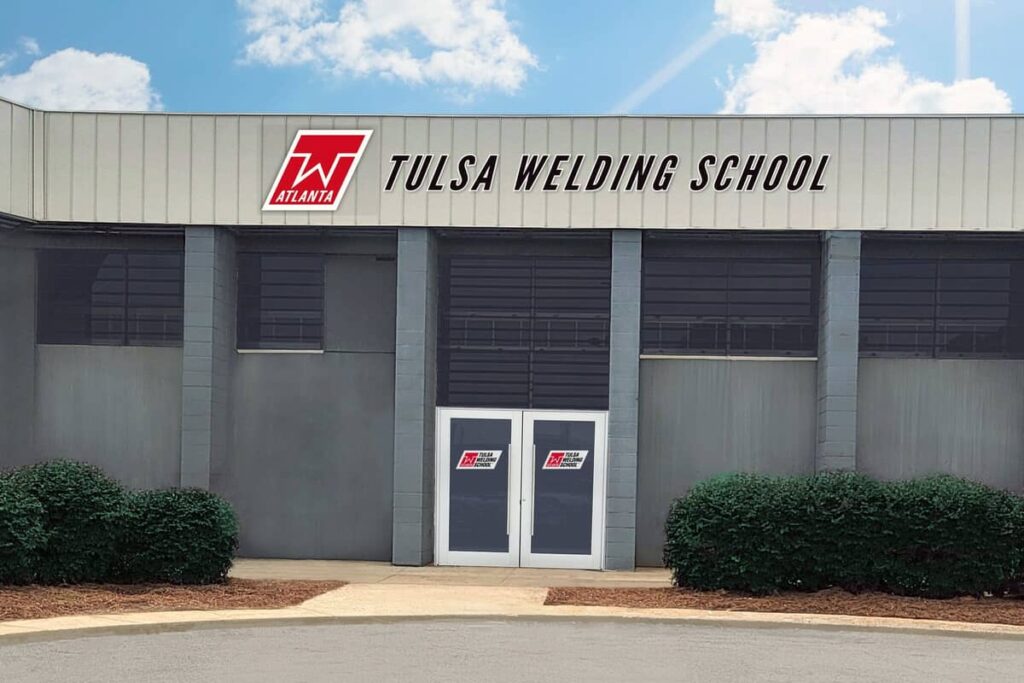TWS is a Great Training Option for Everyone
Learn more about how we can prepare you to advance your career.
The Houston Chronicle reports that the total number of jobs available for pipefitters will increase by 26% between 2010 and 2020, according to the BLS. The average salary for pipefitters in the United States is currently $51,830 per year, with the top ten percent earning over $80,000 per year.
Training at Tulsa Welding School prepares an aspiring pipefitter for a promising career. Whether you chose to enroll in the Pipefitting Training Program or the Welding Specialist with Pipefitting Program, you will receive comprehensive in-class and hands-on instruction. Moreover, either program can be completed in less than a year, enabling to start your pipefitting career as soon as possible.
Upon graduation, you may wonder what kind of credentials you need to obtain in order to work as a pipefitter. As a matter of fact, certification and licensing requirements for pipefitters differ from state to state. Here’s an overview of the credentials required for pipefitters for each state:
ALABAMA
Pipefitters are licensed in Alabama by the state’s Plumbing and Gasfitters Examining Board.
Have You Considered a Career in the Skilled Trades?
Fill out the form to recieve a no obligation info packet.
ALASKA
Pipefitters in Alaska need a plumber’s license issued by the Alaska Department of Labor and Workforce Development.
ARIZONA
Pipefitters in Arizona are required to hold a contractor’s license issued by the Arizona Registrar of Contractors.
ARKANSAS
In Arkansas, a pipefitter needs both a contractor’s license as a plumber from the Arkansas Contractors Licensing Board and a license from the Arkansas Department of Health.
CALIFORNIA
California requires a pipefitter to have a contractor’s license issued by the Contractors State License Board depending on the type of work they perform.
COLORADO
Colorado pipefitters need a license by the Colorado Department of Regulatory Agencies.
CONNECTICUT
A pipefitter needs to get a Plumbing & Piping Contractor’s License issued by the Connecticut Department of Consumer Protection.
DELAWARE
Delaware’s Division of Professional Regulation issues journeyman licenses after apprentices have at least seven years of experience.
DISTRICT OF COLUMBIA
The District of Columbia Board of Industrial Trades requires pipefitters to have a plumber’s license.
FLORIDA
Florida’s Construction Industry Licensing Board issues a license to be a Certified Plumbing Contractor that includes the pipefitting specialty.
GEORGIA
The Georgia Board of Residential & General Contractors provides licenses to pipefitters in Georgia.
HAWAII
The Department of Commerce and Consumer Affairs issues contractor licenses for pipefitters.
IDAHO
The Idaho Bureau of Occupational Licenses issues licenses for plumbing contractors and journeymen.
ILLINOIS
Pipefitters do not need1 a license in Illinois.
INDIANA
The Indiana Plumbing Commission issues apprentice plumber and journeyman plumber licenses needed to work as a pipefitter.
IOWA
Pipefitters must register as a contractor with Iowa’s Division of Labor Services.
KANSAS
Kansas does not provide licenses for pipefitters on a state level. Nevertheless, licenses may be required on a local level.
KENTUCKY
In Kentucky, the Department of Housing, Buildings & Construction issues licenses for pipefitters.
LOUISIANA
The State Licensing Board for Contractors is the regulatory agency in Louisiana that handles the licensing of pipefitters.
MAINE
The Professional & Financial Regulation Board in Maine issues licenses that cover the work of pipefitters.
MARYLAND
Pipefitters need a journeyman or master license from the Maryland State Board of Plumbing.
MASSACHUSETTS
The Massachusetts Department of Public Safety requires pipefitters to obtain a license.
MICHIGAN
Michigan issues apprentice, journeyman and master licenses for pipefitters through the Plumbing Division of the Department of Licensing and Regulatory Affairs.
MINNESOTA
In Minnesota, pipefitters need a plumbing license issued by the Minnesota Department of Labor & Industry.
MISSISSIPPI
Mississippi pipefitters need a commercial construction contractor’s certificate with a special mechanical certification issued by the Mississippi State Board of Contractors.
MISSOURI
The state of Missouri does not provide2 statewide contractor’s licenses. Local ordinances may apply.
MONTANA
Pipefitters in Montana require a plumbing license issued by the Montana Board of Plumbers.
NEBRASKA
There are no specific3 licensing or certification requirements for pipefitters in Nebraska. Contractors working in counties that have populations over 100,000 people must have a business license.
NEVADA
Pipefitters working in Nevada need a contractor’s license issued by the Nevada State Contractors Board.
NEW HAMPSHIRE
The Bureau of Building Safety & Construction issues licenses for those wanting to work as pipefitters in New Hampshire.
NEW JERSEY
Pipefitters need a license issued by the State Board of Examiners of Master Plumbers in New Jersey.
NEW MEXICO
In New Mexico, pipefitters need to get a license for mechanical plumbing from the New Mexico Regulation & Licensing Department.
NEW YORK
New York has no4 statewide licensing for pipefitters. All the regulations that apply to pipefitters are at a local level.
NORTH CAROLINA
Anyone doing pipefitting work in North Carolina falls under the general category of plumbing and needs to have a contractor’s license issued by the North Carolina Licensing Board for General Contractors.
NORTH DAKOTA
The State Plumbing Board issues licenses to pipefitters in North Dakota.
OHIO
Pipefitters need to have a contractor’s license issued by the Ohio Department of Commerce.
OKLAHOMA
Pipefitters in Oklahoma require a license from the Construction Industries Board.
OREGON
Pipefitter licenses are issued by the Department of Consumer & Business Services.
PENNSYLVANIA
There are no licenses5 required for pipefitters in Pennsylvania.
RHODE ISLAND
Pipefitters must obtain a license from the Rhode Island Department of Labor and Training.
SOUTH CAROLINA
In South Carolina, pipefitters need a mechanical contractor’s license from the South Carolina Contractors’ Licensing Board.
SOUTH DAKOTA
The South Dakota State Plumbing Commission issues apprentice, plumbing contractor and journeyman plumber licenses.
TENNESSEE
Tennessee requires pipefitters to have a contractor’s license issued by the Board for Licensing Contractors.
TEXAS
Texas pipefitters must be licensed through the Texas State Board of Plumbing Examiners.
UTAH
Pipefitters in Utah need a license from the Division of Occupational and Professional Licensing.
VERMONT
In Vermont, pipefitters need a plumbing contractor’s license issued by the Department of Public Safety.
VIRGINIA
The Department of Professional and Occupational Regulation in Virginia issues journeyman licenses under the Tradesmen Program.
WASHINGTON
Washington requires pipefitters to register as a specialty contractor with the Department of Labor & Industries.
WEST VIRGINIA
The West Virginia Division of Labor issues contractor licenses for pipefitters.
WISCONSIN
The Wisconsin Department of Safety and Professional Services provides several credentials to pipefitters.
WYOMING
There is no statewide program in Wyoming to license pipefitters. Local and county regulations apply instead.
General Pipefitting Work Requirements
Many states require a minimum amount of years working as an apprentice before applying for the full journeyman license. Some states allow further qualifications to a master level after being a journeyman. Besides needing to have the proper levels of experience, there are rigorous tests that pipefitters have to pass to obtain these certifications. However, hard work and study will often pay off for those who dedicate themselves to this in-demand 6 career. Contact Tulsa Welding School for information about enrolling in a pipefitting training program.
1. http://contractors-license.org/il/il.htm
2. http://contractors-license.org/mo/mo.htm
3. http://contractors-license.org/ne/ne.htm
4. http://contractors-license.org/ny/ny.htm
5. http://contractors-license.org/pa/pa.htm
6. http://www.bls.gov/ooh/construction-and-extraction/plumbers-pipefitters-and-steamfitters.htm#tab-6
This blog has been labeled as archived as it may no longer contain the most up-to-date data. For a list of all current blog posts, please visit our blog homepage at https://www.tws.edu/blog/








